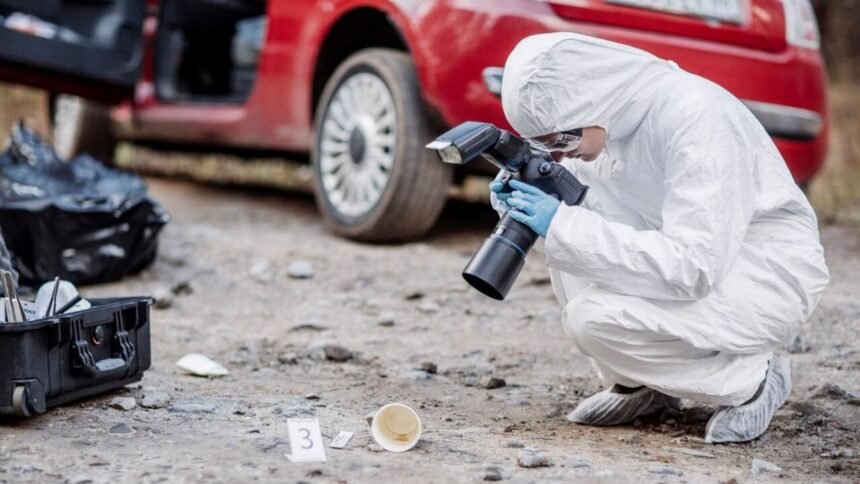Careers of a crime scene investigator are one of the most interesting and vital careers in criminal justice system. These are the professionals who operate behind the scenes and gather, study, and evaluate the evidence at crime scenes. They aid in the resolution of crimes and in ensuring that victims get justice, thus making their job interesting and demanding. This blog will address what criminal scene investigators do, what are the qualifications needed, the crisis they encounter as well as how someone can start a career in this field.
Crime Scene Investigator What is a Crime Scene Investigator?
A crime scene investigator ( CSI ) collects, examines and maintains crime scene evidence. This may be fingerprints and DNA, bloodstains and the like ballistic evidence. Law enforcement agencies rely on the CSI to supply the physical evidence that will help them in developing cases and bringing criminals to justice. Their work is often perceived as the balance between the law enforcement and the courts because they offer the scientific evidence that may either support or reject the facts that are being brought forth in a case.
Tasks of a Crime Scene Investigator
There are numerous responsibilities of crime scene investigators most of which tend to help in solving crimes accurately and on time. They are primarily responsible with:
Securing the Crime Scene: It is also one of the initial tasks of a CSI to secure the crime scene. This will avoid contamination of evidence and all the things on the scene will remain untouched to be analyzed.
Evidence Collection: The crime scene investigators gather any kind of physical evidence at the crime scene. These comprise, among other things, blood samples, weapons, fingerprints, and any objects which might have been discarded or left behind by the offender.
Evidence Documentation: Once the evidence is gathered, CSIs take great care to document it all. The procedure entails the photography of the crime scene, comprehensive note-taking, and documentation of the already retrieved items.
Evidence Analysis: Evidence in most cases will be self analyzed by the CSIs in the lab. These may include activities like DNA, fingerprints, and chemical tests to ascertain existence of some substances.
Appearing in Court: In various instances, the CSIs might be called upon to present testimony in the court regarding the evidence collected or examined. They can also give qualified testimony in order to assist in explaining complicated forensic results to a court or a jury.
The Skills Required to be a Crime Scene Investigator
The crime scene investigation professionals must possess a varied skill set in order to excel. Among the key skills, one may find the following:
Carefulness: Crime scene investigators have to be extremely careful. Evidence either makes or breaks a case and the most minute piece of evidence may be of importance and the CSIs have to make sure that nothing is left out.
Critical Thinking: Critical thinking is very vital in examining evidence and coming up with its pertinence to the case. Crime scene investigations in many cases are forced under the circumstances to reconstruct a sequence of information which could be broken in pieces to come up with a complete story.
Problem-Solving: A crime scene investigation is a continuous process of problem-solving. Seeing how a crime was committed to finding the person who did the crime, CSIs need to possess an orderly way of solving intricate problems.
Technical Expertise: CSIs must feel free to work with different kinds of scientific gadgets and technology. This can extend to DNA analysis equipments to fingerprinting machines and all of which needs special expertise.
Communication Skills: As much as the work that a CSI does is an individual one, he/she should be able to explain his / her findings as well. Efficient communication is essential whether it refers to the nature of reporting evidence on paper, communication with the police concerning the discovery of the evidence or giving testimony during a trial.
Crime Scene Investigator job requirements and Education
One has to be a crime scene investigator, which needs education and special training. The following is an outline of the learning process in getting into the field:
Basic Education: The first step is a high school diploma. Nevertheless, this is also a narrow profession, and additional studying will be required.
Degree Programs: A large percentage of crime scene investigators have a degree in forensics science or criminal justice or biology or chemistry. A college degree, considered in most cases a bachelor degree is the required requirement although, an advanced degree in the medical field especially in forensic science or a similar subject can be used as a competitive advantage in the employment market.
Certification: Even though certification is not impulsive; it is very useful. International Association for Identification (IAI) certifications are available in the crime scene investigation. Furthermore, the law enforcement bodies can provide education courses that involve certain techniques of crime scene investigation.
Experience: Crime scene investigators normally have an experience, which they get through internships, on the job training, or being law enforcement officers then converting to the position of CSI. Evidence collection and analysis cannot be underestimated as very rich experience received during fieldwork.
The Problems of Crime Scene Investigator Work
Although the job of a crime scene investigator is very rewarding, it is full of challenges. The following are some of the greatest challenges in the field:
High-Pressure Situations: There are several cases of high pressures that crime scene investigators have to manage, especially in high-profile cases and cases involving violent crimes. They are required to gather evidence at a very fast and efficient pace and this can give them the feeling of a run-against-time.
Emotional Cost: Crime scenes can be hard to investigate. The case involving violent crime or killing is often faced with CSIs which results in disturbing scenes in most cases. Occasionally emotional burden is a load on the mind and hence, it is important that field professionals develop high coping skills.
Study Requirements: Crime scene investigation may also be physically challenging. During the course of work, CSIs might be required to put in lengthy shifts, move to the scene of crime, and even act under poor or unsecure conditions. It is not only the physically demanding but also a mentally tough job.
Advances in Technology: The About Forensic Science field keeps developing. On the one hand, it is an exciting part of this job; on the other hand, it is the task of crime scene investigators to be updated on new technologies and methods. It is also an ongoing learning process which can be very demanding and time consuming.
Prospects in this Career Occupation of Crime Scene Investigater
According to the U.S. Bureau of Labor Statistics, the demand and growth of crime scene investigators would be able to maintain its stable status, which is pegged to be at 3-4 percent in next 10 years. The occupation is gaining acceptance as a part and parcel of the criminal justice process, and as this form of science constantly develops the more there will be a demand created to ensure efficient personnel are well trained.
Although the job of crime scene investigators is very competitive, it is also a promising career that one can be able to do well since there is room to advance his career. Experience enables CSIs to advance into leadership positions, specialize in a particular form of evidence (e.g., digital forensics), or even become professors of forensic science at the college level.
Expert Quote
Crime scene investigators are very important members of the criminal justice system. Details collected, stored, and examined by them are crucial in case resolving and restoration of justice to the victims says Dr. Sarah L. Cook, the professor in the department of forensic science and criminal investigation expert.
How to Fit into the Jobs as Crime Scene Investigators
Whatever field of crime scene investigation interests you, the first thing that you must do is to acquire the education required and obtain the corresponding experience. Seek out some internship or volunteer positions in law enforcement or forensic laboratories in order to gain some real-life experience. After gaining the necessary qualifications, you will then be able to seek the position of CSI in state, local, or federal police force or forensics labs or even privately run forensics analysis companies.
As well, networking and receiving updates on trends in your industry using such sources as the International Association of Identification (IAI) may allow you to be competitive in this industry.
Conclusion
The job as a crime scene investigator is an aspect of the criminal justice system that involves a combination of skills of an investigator, scientific field, and law enforcement cooperation. It is not a very easy task to work out in a law enforcement field, but the fruits of accomplishment in this area as well as helping threatening people get justice make such an occupation very rewarding to those, who have the deep interest in science and love to be police servants. There are vast opportunities in the field and regardless of whether you are just getting in there or are interested in advancing your career, the chances to grow are enormous and the need of talented professionals is not likely to drop.
With the development of forensic science into further complexities, crime scene investigators will be in the centre of crime-solving to make sure that justice is delivered through proper appraisals of analysis and adept dealing with the evidence at hand.






